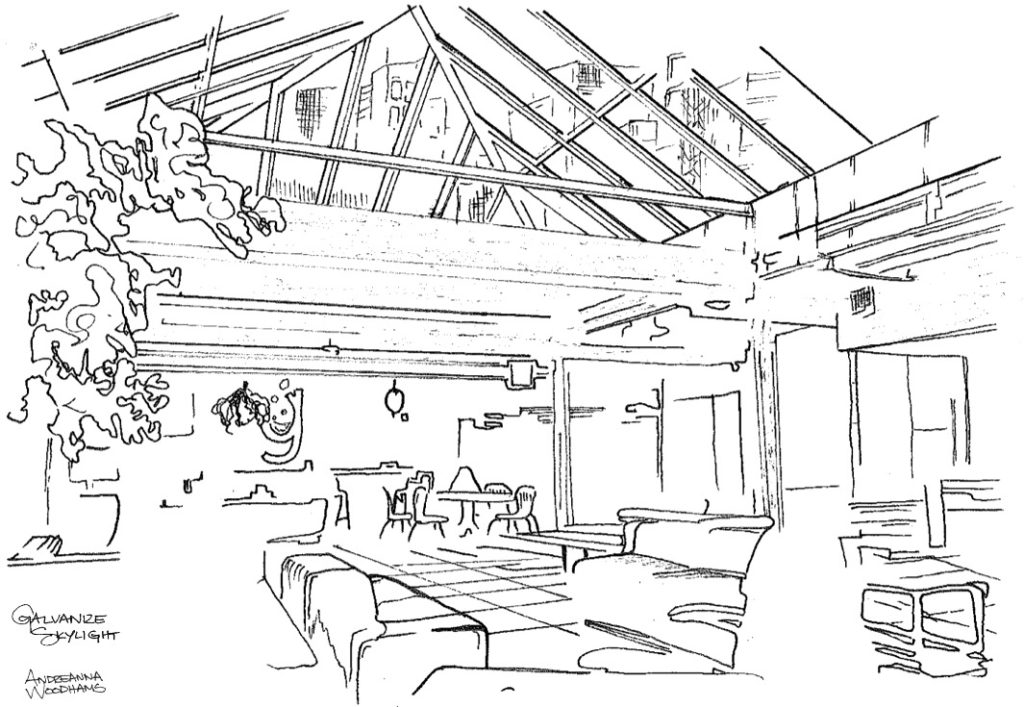
Galvanize San Francisco is an entrepreneurial hive: a tech campus, incubator and corporate innovation lab, all buzzing and thrumming in one dynamic five-story building. Smack in the heart of San Francisco’s entrepreneurial SoMa district, the community is comprised of 1,000 members, including 250 startups, 200 tech students, and elite corporate partners, while playing host to a frenetic, diverse mix of 30 to 40 events every week. Galvanize SF is one of eight campuses nationwide, with other locations in Denver, Seattle, Austin, and New York.
This is our second in a series on local and international incubators and technology hubs, a deep dive into what makes early-stage startups and high-performing entrepreneurs tick. Andreanna Woodhams created the drawings. Jonathan Littman interviewed Michael Seiler, Galvanize’s National Events Director. 如果您想看中文版本,请跳到最底页
The Secret Sauce: Public Space and Anchor Tenants
Hospitality is part of our secret sauce. Every Galvanize campus has an open-to-the-public café. We want all sorts of people, from both in and out of the industry, to be able to come to our events. You don’t need to sign in and sign an NDA. The look is an industrial meets tech modern design. The previous tenant was an architecture firm, and we spent about a year retrofitting it. There’s a lot of exposed brick and concrete floors, and pipes in the ceiling. Juxtapose that with glass walls, high ceilings, and a modern café, with an interesting, angular bar.
When we first leased the building in early 2014 we had five floors plus a lower floor and rooftop. The fourth floor opened a few months later, and that was huge, because it enabled us to do a soft launch with some startups and foundational partners, and to host events and do marketing and tours. That floor gave us the ability to bring people in, even though we hadn’t fully opened.
Google for Entrepreneurs, IBM, and Silicon Valley Bank were our founding partners. Google for Entrepreneurs is focused on helping entrepreneurs and startups grow. They designate tech hubs around the country, and they chose us for SF. That gave us immediate credibility for workshops and mentors from Google. IBM also chose Galvanize to be the home for its Bluemix Garage, and built its app-development platform and housed its team in our SF campus. Silicon Valley Bank provides free Finance 101 classes to startups with the idea that they’ll hopefully become clients. So they started offering everything from how to set up a startup P&L, raise Series A funding, and organize finances.
The Grand Opening and Building a Culture
We opened the entire building with 700 people around the 2014 holidays. There was some chaos, but pretty quickly we got all the nuts and bolts figured out. We had probably 75 percent capacity, starting with 150 startups and roughly 75 students. The culture starts with the application process. We’re looking for “mobile first” startups. Is this a company looking to set up shop, or one that wants to take advantage of the programs and mentor sessions? Are they going to participate in our community “Meet and Eats,” our “Lunch and Learns,” our Community Happy Hours? If not, we’re OK to say “no” and forgo the revenue.
The building lends itself toward breaking down barriers. In any particular room, we’ve got companies working on their own thing, sitting next to others doing something completely different. You just start to build relationships and friendships. You’re building a fintech venture, and you’re looking to get some help with email marketing. Then that person next to you says, “That’s what I do.” You might be at your desk or a Lunch and Learn. It just happens spontaneously.

The Pivot: Connecting Coding and Enterprises
Early on, the focus was on coalescing the community of entrepreneurs and startups, but then there started to be so many job opportunities. Immersive education in tech has become a much larger part of our model. We’ve transitioned from big company suites and event spaces in San Francisco and turned them into classrooms. We still have a lot of early stage startups, but now you’ll see more established companies. That speaks to having more graduates.
Booz Allen Hamilton takes space at Galvanize SF because it gives them access to students working on their capstone projects, and they can also learn [coding and startup culture] and grow. Enterprise relationships have become a greater focus because there’s such a high demand. Every company today needs to build an online presence, and everyone needs data analytics.
Price Waterhouse takes suites in each of our campuses, and we train Allstate employees around the world. A few of the executives [from these corporate giants] work out of our campuses. Their leaders speak on panels, they mentor startups. It’s not just about the training. Let’s say IBM Watson wants to advance new technology. We can host a series of events at our campuses that engage our development communities.
Mobile Savvy, Growth-Focused Members
Our members are all tech startups –– from fintech to medtech, healthtech, adtech, and foodtech. Take any industry and put tech on the end of it and we’ve likely got a startup in that category. We also have consulting startups working to help other companies implement data science and artificial intelligence. Accelerator programs set up shop at Galvanize, like Growth X Academy. They’re similar to what we do. You can enroll in the Academy and learn growth marketing and entrepreneurship.
BootstrapLabs, for instance, is a VC firm that brings in cohorts from all over the world and offers Silicon Valley immersion. They also have an artificial intelligence fund, and last year put on an Applied Artificial Intelligence Conference at our San Francisco campus.
Our members include Will Bunker, the Match.com founder, and Women Who Code, a non-profit tech organization focused on equalizing the gender ratio in tech. We have a refugee from Iraq, who enrolled in our data science program and is now working. Martha was a touring musician who was trying to make ends meet. She toured the country, but needed something more stable, and she took our three-month data science program. She had no computing background, but it turns out that learning and analyzing data is much the same as music. So much so that she’s now one of our instructors. Our most interesting student story may be the man who was recently pardoned by President Obama. Chris had served ten years for growing marijuana. He enrolled in our web development program, and now he is a web developer at Amazon, easily able to provide for his family.
Accelerated Learning
There is this understanding that the tech industry is constantly evolving, and that the traditional models of education can’t keep up. Whether it’s learning the right coding language, or what you need to do to raise a Series A, our concept is to be constantly evolving thought leaders. Galvanize is a fluid and dynamic learning environment filling the gaps and potentially replacing traditional educational institutions.
Our programs range from a three-month data science program, to a six-month web development program to a one-year accredited Masters in Data Science. Graduates from our three-month program are candidates for junior data science positions at pretty much any company [Galvanize purports to have a 92% job placement rate for graduates]. Starting salaries are $80,000 to $100,00, and it’s not uncommon for starting salaries to be over $110,000.
Inspiration from other Tech Incubators
Impact Hub in Oakland is a good one. The design is beautiful and it feels eco-friendly. The name says it all. The only companies inside have a social mission. You’re bringing together these startups and this motivated community of people who are trying to change the world.
We’re grateful to Michael Seiler for sharing his insights. Galvanize is radically different from other tech hubs in the way it combines a tech campus, startups and a hearty corporate focus. Few hubs can compete with Galvanize for the number and quality of events that they host. This holistic approach to community building and a market responsive model to technical training and entrepreneurism raises the bar for all of its members. Consider our case study questions below for a deeper reflection on tech community done right, and if you haven’t read it yet, take a look at the first tech incubator in our series, San Francisco’s Runway.
我们是如何运作的:Galvanize,初创公司的蜂巢
旧金山的Galvanize是一个创业蜂巢:集合了一个科技学校,孵化器和企业创新实验室为一体的Galvanize,所有的嗡嗡声和嘈杂声聚集在这栋富有动感的五层楼里。恰好在旧金山富有创业氛围的SOMA(南市场街)地区,Galvanize的社区有一千名会员,其中包括了250个初创公司,200个学生和顶级的企业合作伙伴,同时每周还主办了大约30到40场热闹的,种类繁多的活动。旧金山的Galvanize是全国八个校园之一,其他地点位于丹佛,西雅图,奥斯丁和纽约。
这是我们第二篇关于本地和国际化的孵化器和科技中心的系列采访,带领大家深入了解是什么成就了这些早期初创公司和高效企业家们。Andreanna Woodhams制作了绘画Jonathan Littman 采访了 Michael Seiler,Galvanize全国活动主管。
秘密配方:公共空间和租户
热情好客是我们的秘密配方之一。每一家Galvanize校区都有对外开放的咖啡馆。我们想要吸引各种各样的人,不论是圈内圈外人士都可以来我们的活动。你不需要签到或者签署保密协议。场地的装修风格是工业设计的与科技设计结合的。这个场地之前的租客是一家建筑公司,我们花了将近一年来改造。有许多裸露的砖和混凝土地板,天花板有很多管道。与其对应的是玻璃墙,吊高的天花板,现代的咖啡馆和一个有趣的有棱角的酒吧。
当我们2014年刚租下这个楼的时候我们有五层楼外加一个低楼层和屋顶。四楼延迟了几个月开放,这对我们来说非常重要,因为这样可以与一些初创公司还有早期合作伙伴们进行软开业并且可以举办一些活动和场地参观。这层楼允许了我们带人进来就算我们还没有完全开业。
谷歌的创业部,IBM和硅谷银行是我们的赞助伙伴。谷歌的创业部专注于帮助创业者和初创公司发展。他们有指定的科技中心在全国各地,在旧金山他们选择了我们。这立马赋予了我们可信度来举办研讨会和吸引来自谷歌的导师们。IBM也选择了Galvanize作为他们Bluemix Garage的主场,也建立了app发展平台并安置了团队在我们的旧金山场地。硅谷银行提供了免费的财务101课程给初创公司并希望这些公司能够成为他们的客户。所以他们逐渐提供各种课程包括了如何设立初创公司,筹集资金和财务管理。
盛大开业和建立文化
我们在2014年假期间开张的时候有着大约700人。那时候有一些混乱,但是很快我们找到了所有的基本要点。我们当时的占用率大约百分之七十五,这当中包括了150个初创公司和75个学生。整个文化从申请过程就开始了。我们寻找“以移动设备为主“的初创公司。我们问自己这些公司是在寻找方式开店做生意,还是想要利用我们特色的项目和导师授课?他们会参加我们社区的“会面和饮食”,“午餐和学习”,或者是我们社区的快乐时间等一系列活动嘛?如果不会,我们会很爽快的拒绝他们然后放弃这一笔收益。
这个建筑开始逐渐打破一些障碍。在任何一间房间里我们会有公司在做他们自己的事情,边上坐着其他公司的人在做完全不一样的事情。你会逐渐建立一些关系和友谊。打个比方你在创立一个金融科技公司,你在寻找电子邮箱营销推广这方面寻求帮助。这时你边上的人告诉你“我就是做这个的!” 这一切发生的时候你可能就在你自己办公桌上或者在我们午餐学习活动上。所有的一切都在很自然的发生。
枢纽:连接编程和企业
早期,我们的重点是凝聚企业家和初创企业社区,这样以后竟然不断涌现出许多工作机会。在科技方面沉浸式的教学变成了我们商业模式里很重要的部分。我们从旧金山的活动场地从大办公楼转变成了教室。我们仍然有很多早期初创公司但是现在你会看到更多成熟的公司。同时也有更多的毕业生。
Booz Allen Hamilton入驻在旧金山的Galvanize因为我们可以提供给他们渠道让学生在他们的重点项目上工作,同时学生也能够学习如何编程和了解初创公司文化。与企业的关系受到了更大的关注因为这方面有着极大的需求。现在几乎所有公司都需要在互联网上生存而且所有人都需要数据分析师。
Price Waterhouse在我们每一个地点都有办公室,我们也培训Allstate在全球的员工。有一些来自全球的高管(从这些巨头公司)也会来我们这里工作。他们会来讲课,他们也会指导初创公司。这不只关于培训。打个比方IBM Watson想要改进新的科技。我们可以举办一些列的活动在我们的场地和我们的发展社区互动。
注重移动端,专注成长的会员
我们的会员所处的初创公司范围广泛—从金融科技到医疗科技,医药科技,广告科技和食物科技。我们感兴趣的公司范围也很广泛,只要拿任何领域放入科技后缀基本就是我们所感兴趣的。我们曾经帮助过初创公司加入数据分析和人工智能。许多加速器也加入了Galvanize,比如Growth X Academy。 他们做的和我们很像。你可以加入学院课程并且学习如果发展市场和创业。
再举个例子BootstrapLabs是一家风投公司带来来自世界各地的合作伙伴并且帮助他们融入硅谷。他们也有一个人工智能基金,去年他们举办了一场人工智能应用的大会在我们旧金山的校区。
Will Bunker也是我们的会员他是Match.com的创始人,同时还是Women Who Code这家非盈利性机构的创始人,这家机构致力于保护科技领域里性别平衡。我们也有来自伊拉克的难民,加入了我们的数据科学项目现在在科技领域里工作。Martha是一个音乐家在全国各地巡回演出。她游走了全国但是想要稳定下来所以她参加了我们三个月的数据科学项目。她没有任何电脑背景但是她发现学习数据分析和学习音乐有很多共同之处。她现在已经是我们的指导员了。我们最有意思的学生故事可能是这个男人最近刚被奥巴马赦免。他是Chris曾经从事了十年的大麻种植生意。他加入了我们网站建设项目,现在他已经在亚马逊工作,非常轻松的可以养家糊口。
加速学习
我们理解科技领域不断在发展,所以传统的学习模式不一定能跟上时代。不论是学习正确的编程语言,还是你所需要的一切知识关于得到第一轮投资,我们的概念是成为不断进化的思想领袖。Galvanize是一个流动的和动态的学习环境填补了传统教育机构的代沟。我们的项目从三个月的数据科学课程到六个月的网站建设课程,还是为期一年的研究生数据科学项目。举个例子我们三个月项目的毕业生从我们的项目毕业以后基本在所有的公司都可以担任资深数据科学分析师一职。(Galvanize毕业就职率式92%)。起步年收入为80000到100000美金,也有许多人的起始工资就超过110000美金。
从其他科技孵化器受到的启发
在奥克兰的Impact Hub就是一家很好孵化器。整体设计很美的同时也很环保。这家名字解释了一切。唯一一家公司在内部有着社会使命。在带领着这些初创公司并且激励社区内的人们来尝试改变世界。
我们非常感谢Michael Seiler与我们分享他的感悟。Galvanize正在快速的区分他们自己与其他的科技中心通过结合科技校区,初创公司和丰盛的企业专注。很少有科技中心能和Galvanize相比,不论是在举办活动的数量和质量上。Galvanize用这种全方面的方式来建立社区并且成为了科技培训界和创新界的市场楷模。为了更加深入了解科技社区该,请考虑我们的底部案例学习问题,还有如果您还没有读过我们的第一篇孵化器案例分析请去看这篇San Francisco’s Runway.


